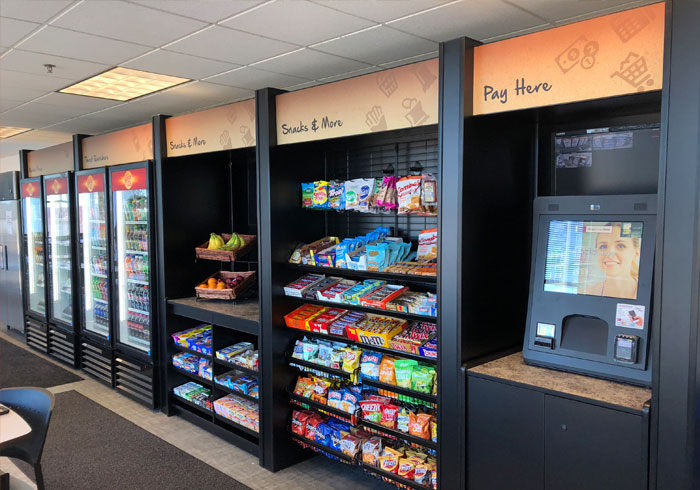Vending machines have long been a staple of modern convenience, offering on-the-go refreshments, snacks, and essential goods. However, their environmental footprint—ranging from excessive plastic waste to high energy consumption—has often been overlooked. The emergence of eco-friendly vending solutions is not just a passing trend but a transformative movement reshaping global commerce. From harnessing renewable energy to integrating AI-driven personalization, these innovations are paving the way for a greener and more efficient future. This article explores groundbreaking advancements, their impact on consumer behavior, and the untapped business potential within this sector.
The Evolution of Vending Machines Toward Sustainability
Renewable Energy-Powered Vending Machines
Traditional vending machines rely on the grid, contributing significantly to energy consumption. The latest eco-friendly models are integrating solar panels and kinetic energy systems to power operations with minimal environmental impact. Japan, a pioneer in vending technology, has deployed solar-powered vending machines in urban centers and remote locations. These self-sustaining units ensure continuous operation even in the event of power outages, reinforcing resilience in disaster-prone areas.
Biodegradable Packaging and Waste Reduction
The transition from plastic-laden vending products to biodegradable and reusable packaging is gaining traction. Startups like “ReVend” are innovating with machines that dispense snacks in edible or compostable wrappers, reducing single-use plastic dependency. Additionally, smart vending units equipped with waste-sorting AI sensors are being deployed to encourage proper recycling by rewarding consumers with discounts or digital tokens for eco-conscious disposal.

Transforming Consumer Behavior Through Smart Technology
Predictive Analytics and Personalized Recommendations
AI-driven vending machines are revolutionizing how consumers interact with on-demand retail. By analyzing purchasing patterns, these machines predict demand fluctuations and optimize inventory accordingly, minimizing food waste and enhancing product availability. Companies like “VendSense” leverage machine learning to offer personalized recommendations, ensuring consumers receive tailored suggestions based on previous purchases and dietary preferences. This not only elevates the customer experience but also reduces overproduction and wastage.
Facial Recognition and Emotion-Based Purchasing
A futuristic yet increasingly viable innovation is the integration of facial recognition and emotion analysis in vending machines. By analyzing facial expressions and biometric cues, these machines assess a user’s mood and suggest appropriate products—be it a protein bar for fatigue or a dark chocolate treat for stress relief. While privacy concerns are paramount, secure, opt-in models ensure ethical data usage. In China, Alipay-integrated vending machines already facilitate facial recognition payments, eliminating the need for cash or cards.
Autonomous Restocking and Supply Chain Optimization
One of the most inefficient aspects of vending machine operations is manual restocking, leading to unnecessary transportation emissions. The latest models incorporate IoT sensors that communicate in real-time with suppliers, enabling autonomous restocking based on real-time demand analytics. By reducing unnecessary refills and optimizing delivery routes, vending businesses can significantly cut their carbon footprint while ensuring seamless availability of products.
The Untapped Business Potential of Eco-Friendly Vending
Sustainable Vending as a Service (VaaS)
With growing environmental consciousness, businesses are exploring vending as a service (VaaS) models that allow companies to deploy green vending solutions without upfront investments. Brands like “GreenVend” lease their eco-friendly vending machines to workplaces, universities, and public spaces, offering a subscription-based model that guarantees maintenance and inventory management while reducing waste.
Hyperlocal and Circular Economy Integration
Eco-friendly vending solutions can play a vital role in strengthening local economies. Machines stocked with locally sourced, organic products reduce the environmental impact associated with long-distance transportation while supporting community businesses. Additionally, circular economy models are emerging, where vending machines dispense reusable containers for beverages and snacks, which consumers can return for washing and refilling—a concept already gaining traction in European cities.
Customizable and On-Demand Vending for Niche Markets
Advancements in 3D printing and on-the-spot customization are enabling vending machines to cater to niche markets. Imagine a vending machine that freshly prepares plant-based protein shakes or 3D-prints biodegradable utensils based on user preferences. This level of customization not only enhances consumer satisfaction but also aligns with sustainability goals by producing only what is needed, reducing excess inventory waste.
The Future of Eco-Friendly Vending: A Glimpse Into 2030
The next decade will witness vending machines evolving beyond mere transactional devices into intelligent sustainability hubs. Envision vending machines equipped with blockchain technology, ensuring full transparency regarding the sourcing and environmental impact of products. Picture AI-powered machines that monitor real-time air quality and dispense eco-friendly masks during pollution spikes.
Furthermore, the convergence of smart vending with augmented reality (AR) may redefine experiential retail. Shoppers could interact with a machine’s AR interface to visualize the environmental impact of their purchase choices, encouraging more responsible consumption.
A Path to a Sustainable Future
Eco-friendly vending solutions represent more than just a technological evolution; they are catalysts for sustainable commerce and conscious consumerism. By integrating renewable energy, predictive analytics, personalized recommendations, and emotion-based purchasing, these machines are reshaping the retail landscape. As businesses, governments, and consumers collectively embrace these innovations, the global vending ecosystem has the potential to drive substantial environmental change while unlocking new economic opportunities. The future of vending is not just about convenience—it’s about sustainability, intelligence, and ethical consumption. Read More>>>>
1 thought on “Examining Eco-Friendly Vending Solutions and Their Global Impact”